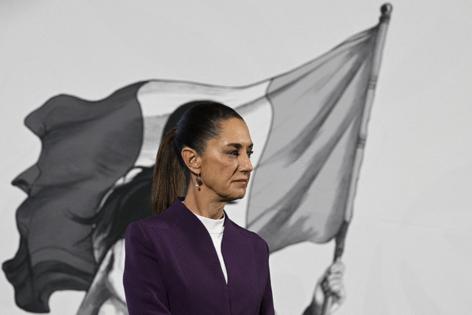Mexico sure it will strike deal with US to skirt tariffs
Published in News & Features
Mexico is projecting confidence that it will fend off a new set of 30% tariffs that President Donald Trump threatened Saturday to impose next month, with talks already underway to avert the worst.
After Trump went public with his plan by posting on social media, Mexican President Claudia Sheinbaum noted in speeches near the northern border that every country has been getting a letter from Trump as he implements global protectionist policies. Her team had already begun discussions with the U.S. on Friday and she was confident Mexico would get a deal.
“We’ve had some experience with these things for several months now,” Sheinbaum said at a clinic opening in Ensenada, Baja California. “And I think we’re going to reach an agreement with the United States government.”
Mexico-U.S. relations have taken a bumpy turn since June, with increasing roundups of migrants by U.S. agents, the border shuttered to livestock due to a screwworm infestation in Mexico, U.S. Attorney General Pam Bondi’s reference to the neighboring country as an adversary, and the financial strike by the U.S. Treasury on three Mexican financial firms accused of aiding fentanyl traffickers. Trump’s letter threatened new tariffs on Mexico due to a lack of progress in challenging the country’s drug cartels.
But behind the scenes, work has been advancing between the Sheinbaum and Trump administrations. Mexico is still in a favorable position relative to the rest of the world and its poised to benefit from protectionist U.S. policies over the medium term, according to Bloomberg Economic’s Felipe Hernandez.
That outlook assumes the U.S. doesn’t apply the 30% rate to goods that are compliant with the U.S.-Mexico-Canada free trade agreement. That exception is part of the plan, but the situation remains fluid, a U.S. official cautioned.
Continuing the exclusion for both Mexico and Canada narrows the scope of Trump’s continental tariffs and would be a lifeline to sectors like the auto industry that rely heavily on the USMCA pact, which was renegotiated under Trump’s first term.
Mexico and the U.S. established a new binational working group on Friday to address security, migration and economic issues, according to a statement posted on Saturday by Mexican Economy Minister Marcelo Ebrard on X. The first major task of the group will be to find an alternative to the tariffs and “protect jobs on both sides of the border,” the statement read.
“We told the group that this treatment is unfair and that we’re not in agreement,” read the statement, jointly signed by the Economy and the Foreign Affairs ministries.
The U.S. president said the 30% tariffs are separate from sectoral ones and could be raised if Mexico retaliates.
“Mexico still has not stopped the Cartels who are trying to turn all of North America into a Narco-Trafficking Playground,” Trump wrote. “If Mexico is successful in challenging the Cartels and stopping the flow of Fentanyl, we will consider an adjustment to this letter.”
On Friday, the son of Sinaloa drug cartel kingpin Joaquin “El Chapo” Guzman Loera pleaded guilty to federal drug-trafficking charges and agreed to cooperate with U.S. prosecutors. The U.S. has blamed the Sinaloa Cartel for leading the fentanyl trade, importing chemicals from China to make pills in Mexico and smuggle them into the U.S.
Last Wednesday, U.S. Treasury extended a deadline that will cut off three Mexican financial firms from the U.S. financial system for potentially aiding in money laundering from the fentanyl trade. The U.S. praised Mexico’s cooperation in the move.
———
(With assistance from Josh Wingrove.)
©2025 Bloomberg L.P. Visit bloomberg.com. Distributed by Tribune Content Agency, LLC.







Comments